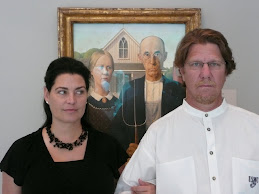This blog is a series of writings completed over several years that explain my take on some of Christianity’s really difficult questions. In order that you might understand my perspective, let me tell you that in the year 2000 the following sentences applied to me:
1) I was a happy agnostic. Expanded a bit, let’s say I was fairly certain there was “a God,” but the concept of Christianity seemed irrelevant to my life.
2) I thought the Bible was pretty much a collection of Holy Canterbury Tales that, uh, beseeched me to be a good person.
3) I thought there was virtually no real evidence supporting the idea that a man named Jesus walked the earth. In fact, I thought that the “reality” of the Bible was one of those things that all Christians had to “accept on faith.”
4) I had a list of objections to Christianity that I viewed as iron-clad, and felt very smug playing “stump the believer” with any Christians I met.
In short, I was in the same place as tens of millions of other Americans.
Then, in 2000, I was forced to attend an Alpha Course at the church where my fiancé and I wanted to be married. Alpha is a 12-week course in Christianity 101, and I had about as much desire to attend as a sheep invited to the Annual Wolf & Bear Pot Luck Supper. I thought for sure I would walk in the door, and Moonies would assault me with questions about my faith and my relationship with “my Lord and Savior Jesus Christ.” I had thus determined in advance that I would attend two sessions: The one and the only.
To my surprise, no born-again assaults occurred—and there in the room I heard a video presentation by an Anglican Priest named Nicky Gumbel explaining the mountain of evidence that the New Testament is both factually correct, and was passed down through the centuries with incredible accuracy.
I learned, in fact, that virtually every scholar of ancient books, be they Christian or Atheist, will agree that the story written in the New Testament is the most historically accurate writing in ancient history-- by a mile.
There are a lot of books that explore “the historical reliability of the Bible” in whatever level of detail you desire, but for a wonderful layman’s explanation, read Amy Orr-Ewing’s book Is the Bible Intolerant? And, for the moment and for the sake of this discussion, let’s just assume I’m not totally making this up: It is a fact that the majority of modern ancient history scholars do agree that the New Testament is an accurate and near-perfect record of the life and times of Jesus.
Note: I did not say they’d agree that Jesus was and is the Son of God. I did not say they’d agree that the reported miracles were actual miracles. I did not say they’d all agree that Jesus was really raised from the dead. I said they’d agree that a dude named Jesus of Nazareth did, for a fact, walk the earth as reported—He said the things they wrote down… he did many things that bystanders believed to be miracles… he was crucified on a cross for blaspheme… and his believers claimed he was raised from the dead.
Now, Nicky explained, if we can ascertain that he really did live, and he really did proclaim to be the Son of God and the only way to heaven (which he clearly did on numerous occasions), the real question is, “Was he right?” What evidence supports his claim?
None, I remember thinking— this is where we’d finally get to the Christian cop out where they say, “You’ve just got to have faith.”
Far from it.
What Nicky explained, referencing also to the works of theologian C.S. Lewis, is that a claim like “I am the Son of God” can only offer three options:
• It wasn’t true, and Jesus knew it wasn’t true. (He was a manipulative liar)
• It wasn’t true, but Jesus didn’t know it. (He was nuts)
• It is true.
Could it be that Jesus was a manipulative liar? An evil man, there to destroy the religion of the Jews, and drag his group of best friends into a life of suffering and death? Possible, but highly unlikely. Wouldn’t an evil man put something for himself in this new religion? Money? Luxury? Women? Maybe at least a house with a roof?
Evil men throughout the centuries have always put themselves first, and used their evil ways for personal benefit. But where do we see Jesus benefiting from anything? He spent his ministry years in poverty-- tending to the needs of the poor and the lame. He laid his hands on lepers. He gave himself up to crucifixion, even when he and his homeboys could’ve split for the hills.
Given the evidence, the idea of Jesus being a con man seems very thin to me. As far as I know, the whole “allowing yourself to be crucified” runs counter to the official con man code.
Next, we have to ask if perhaps Jesus was insane—insane to the level of a current person believing they are Napoleon, or Elvis, or, well, Jesus. Could he have been nuts? Again, possible, but highly unlikely. Wouldn’t there have been some evidence recorded of him saying or doing nutty things?
Again, Nicky Gumbel asks his viewers to consider his teachings—in 2,000 years, no one has improved on the moral teachings of Jesus. Our entire Western World is built on morality and laws he taught. His teachings are, as Nicky says, “the kinds of things you would expect God to say.” Once again, I’m forced to admit that it’s highly unlikely that Jesus was insane.
So… what’s left? Oops. Allow me to quote C.S. Lewis, who’s a lot smarter than I’ll ever be: “A man who was merely a man and said the sort of things Jesus said would not be a great moral teacher. He would either be a lunatic - on the level with the man who says he is a poached egg - or else he would be the Devil of Hell. You must make your choice. Either this man was, and is, the Son of God: or else a madman or something worse… But let us not come up with any patronising nonsense about His being a great human teacher. He has not left that open to us. He did not intend to.”
While this concept certainly put the hooks in me, I soon encountered two additional facets that required deep pondering:
First, after Jesus’ resurrection and ascension into heaven, his Apostles began traveling the known world preaching the message they’d been taught. And, as we know from history, all but one were put to death for those teachings, and their refusal to recant them. Now let me ask you: How many people do you know who’d be willing to die for something they didn’t believe in? Zero is my answer, too.
Second, consider the rise of the church itself. Christianity swept across the known world, rising exclusively from the teachings of one Jesus and a handful of Apostles. It offered no rise in social status for conversion, nor riches, nor extra wives, nor favor with the local zoning board.
In fact, it got a whole boat-load of converts fed to some Roman lions. How could this be? How could Christianity, if it was no more divine than Scientology, overcome these obstacles, and subsequently grow to the largest religion on the planet?
Since I’m a betting man, I bet that it couldn’t.
This was enough evidence to convince me that I should investigate further. So I attended more Alpha courses; I talked to studied Christians; I talked to Priests and Pastors; I read books; I thought, and prayed as best I could; I attended lectures; In short, I did my homework like my life depended on it.
This blog explores the discoveries I made, and explains my take on some of the tough issues. Maybe it will be helpful to you.
Friday, February 19, 2010
Subscribe to:
Post Comments (Atom)



Right on!
ReplyDeleteAwesome! I believe that your blog will help a whole lot of people who are still where you were in 2000. Josh McDowell's More Than a Carpenter and Evidence that Demands a Verdict were two of the books that helped me because I considered myself a Christian, but didn't know the Truths of The Gospel or in fact none of the Old Testament. Keep at it, you may never know the ministry seeds you are planting for others!
ReplyDeleteE>
ReplyDelete